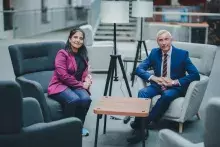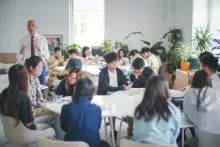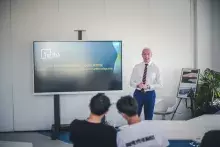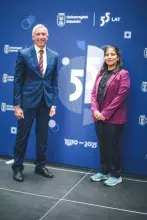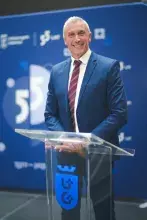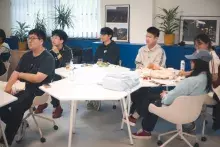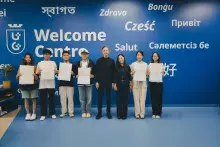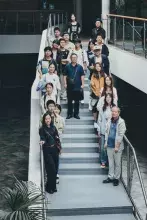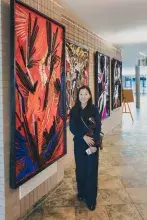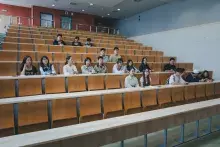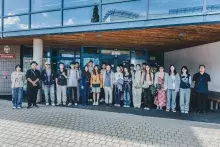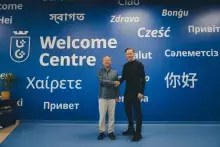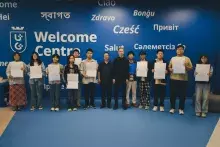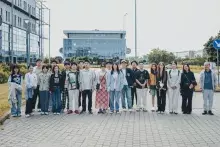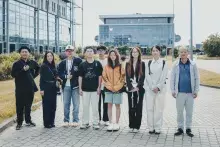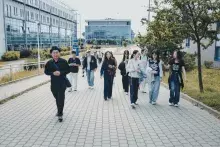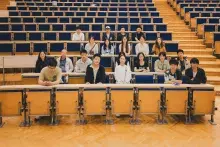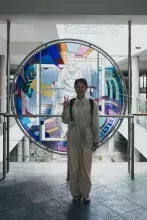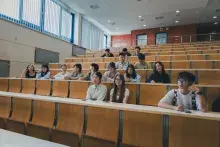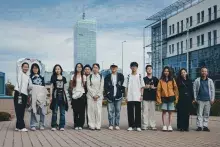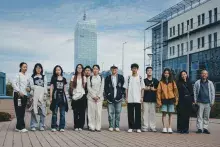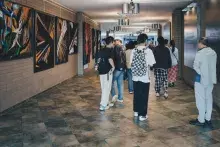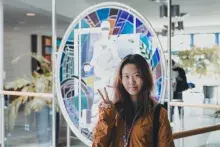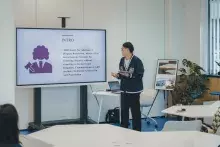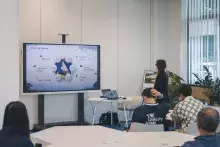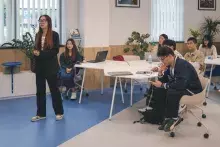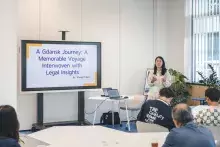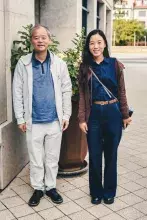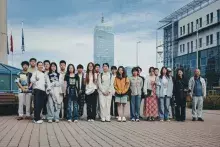First Summer School with Chinese Partners: Historic Collaboration with 3 Universities Successfully Concludes at our Faculty
Our Faculty successfully concluded an intensive International Summer School program that brought together scholars and students from across the globe for a comprehensive exploration of constitutional law, comparative legal systems, and contemporary legal challenges.
The 9-day program, which ran from July 5-14, 2025, featured a distinguished lineup of international speakers and covered critical topics ranging from constitutional transitions and anti-corruption measures to digital ethics and human rights practice. The summer school exemplified the Faculty's commitment to fostering international academic cooperation and advancing legal scholarship through cross-cultural dialogue.
The program's academic coordinator, Prof. Edvardas Juchnevicius, deserves particular recognition for his exceptional organizational efforts and visionary leadership in bringing this ambitious project to fruition. Under his guidance, the summer school attracted participants and speakers from multiple countries, creating a truly international learning environment.
The event featured notable contributions from Prof. Eduard Agamberdiev from Tashkent State University of Law (Uzbekistan), who presented on "Constitutions in Transition: Uzbekistan & Beyond," and Prof. Sarvar Otamuratov, who explored the intersection of social norms and sharing-economy regulation. Dr. Nadia Ahmad from Prince Mohammad bin Fahd University (Saudi Arabia) delivered masterclasses on "ADR 4.0: Greening Arbitration & ESG Settlements," while Prof. Raimundas Kalesnykas from Turiba University (Latvia) conducted engaging workshops on rule-of-law and anti-corruption safeguards. The program also featured online contributions from Prof. Svetlana Moroz from Caspian University (Kazakhstan).
The academic program was enriched by contributions from University of Gdansk faculty. Prof. Edvardas Juchnevicius delivered a keynote on storytelling, while Mr. Stefan Biedronka presented insights from his recent blended-intensive program on AI, loneliness, and digital ethics, and later guided participants through case-study sprints on gig-work data-ethics puzzles, connecting these contemporary challenges to EU platform directives.
A particularly significant highlight of the international collaboration was the strong participation from Chinese universities, marking the first ever summer school organized by our Faculty in cooperation with Chinese partners. The summer school welcomed students from three distinguished Chinese institutions: Ocean University of China, Yancheng Institute of Technology, and Dalian Minzu University, creating a rich multicultural learning environment and establishing a historic milestone in the Faculty's international partnerships.
Special acknowledgment goes to Ms. Xuan Feifei from School of Law at Ocean University of China, Prof. Liu Jian, and Prof. Ming Yu, Associate Dean of School of Law at Ocean University of China, who facilitated and supported the participation of Chinese students. Prof. Liu Jian and Ms. Xuan Feifei also accompanied the students throughout the program, ensuring seamless cultural and academic exchange. Prof. Ming Yu played a crucial role in establishing this valuable partnership as supported the process from its beginning.
The summer school's curriculum was carefully designed to balance rigorous academic content with cultural immersion. Participants engaged in comparative constitutional analysis, explored alternative dispute resolution mechanisms, and examined contemporary challenges in data ethics and corporate governance. The program included innovative formats such as crisis-cabinet simulations, team-based constitutional quizzes, and case-study sprints.
Cultural components included visits to the Gdansk Amber Museum, exploring the Baltic amber trade's legal history, and an excursion to the European Solidarity Centre, where participants gained insights into Poland's democratic transitions. The program also featured a tour of the seaside cities of Gdynia and Sopot, and concluded with a "Polish Culture & Language Lite" session and traditional pierogi feast.
The success of this ambitious program was the result of a collaborative initiative led by Prof. Edvardas Juchnevicius, Dean's Representative for International Cooperation, with a support of Prof. Marcin M. Wiszowaty, Vice Dean for International Cooperation and Development. Prof. Juchnevicius's dedicated efforts were particularly crucial to the event's success - from his meticulous work in drafting the comprehensive academic program and personally inviting distinguished international lecturers, to his hands-on management of the activities at the premises throughout the entire event. His vision and daily coordination ensured the seamless execution of this complex international initiative.
Prof. Wiszowaty provided essential support in the preparatory phase, contributing to months of detailed planning discussions, handling administrative formalities, and assisting with practical arrangements including airport transfers alongside Prof. Juchnevicius. Although unable to attend the entire program due to prior international commitments, his coordination work helped lay the groundwork for the event's smooth operation.
The summer school's success was further made possible through the collaborative efforts of multiple university departments and leadership. Special appreciation goes to Prof. Wojciech Zalewski, Dean of the Faculty, for his support of this international initiative. Particular gratitude is extended to the dedicated team of the Office of Cooperation and Internationalization of the University of Gdansk for their exceptional engagement and invaluable assistance throughout the entire process, as well as to the Legal Department of the University of Gdansk and the Student Housing Board for their essential support and dedication in bringing this ambitious program to life.
The successful conclusion of this international summer school represents a significant milestone in the Faculty's internationalization efforts and demonstrates the power of academic collaboration in addressing global legal challenges. The program has established strong foundations for continued partnerships and future collaborative initiatives.
The certificate ceremony on the final day recognized participants' dedication and the valuable contributions of all speakers and organizers. As captured in the closing group photo, this summer school has created lasting connections that will undoubtedly contribute to ongoing international legal scholarship and cooperation.





